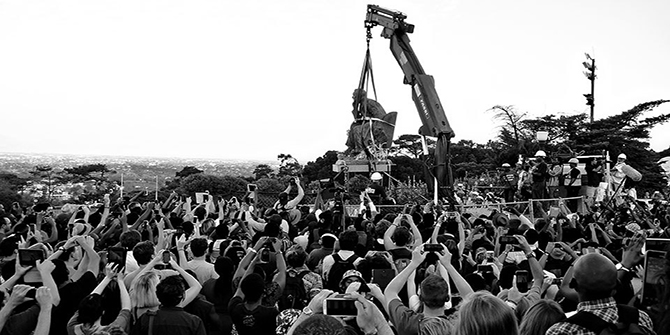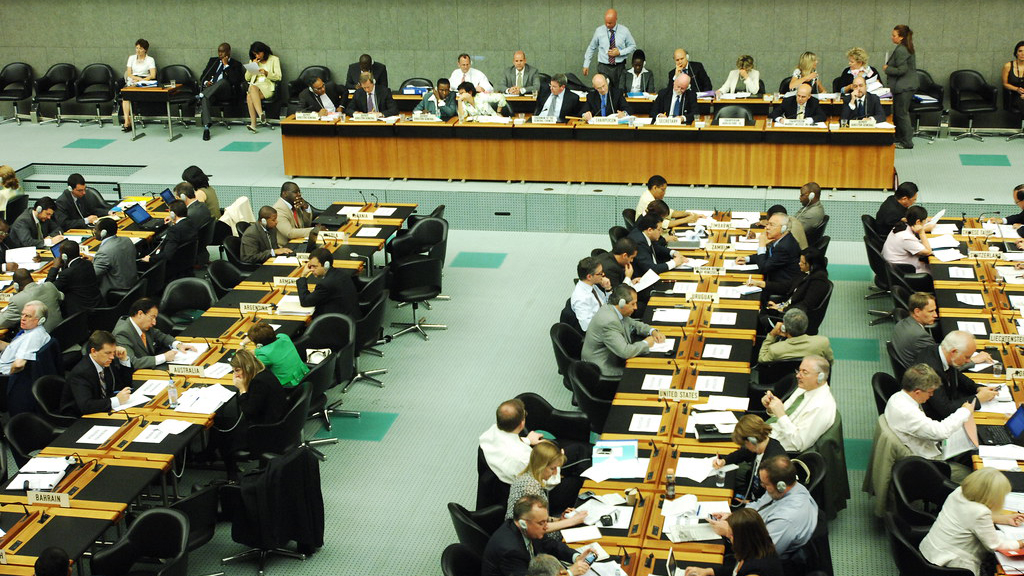It’s been five years since the Rhodes Must Fall movement began at the University of Cape Town and four years since its UK avatar was spawned in Oxford. What has been achieved, what has been compromised, and how do we move forward? A new series at LSE applies a critical lens to these questions.
In a joint collaboration between the LSE Firoz Lalji Centre for Africa, the LSE Eden Centre for Education Enhancement and the LSE Higher Education Blog, we will examine decolonising movements in academia over a series of four events running through the year. Chiefly, how can we move debates on decolonisation into new areas with practical and theoretical implications for higher education and international research?
The four events in the Decolonising the University series are:
- Decolonising the Global Publishing Industry
- Has Decolonising Been Colonised?
- Decolonising the Teaching, Career, and Campus Environment
- Decolonising Global Research
Each of the three members co-leading this series explain below why they feel there is a need for such an initiative.
Lee-Ann Sequeira
Editor, LSE Higher Education Blog; Academic Developer, Eden Centre
By several measures, the decolonising movement is making good progress in UK universities – decolonising features in university initiatives and working groups, buildings are being renamed, reading lists are becoming more racially diverse … and it’s generally moving in the right direction. However, as statues are toppled, new posts created, and conferences and journals launched, it’s important to examine, evidence and discuss the nature of this movement – what shapes our understanding of the Global South and the global ethnic majority (GEM), how has the discourse/narrative changed, whom does this benefit and who is (further) marginalised.
At the LSE Higher Education Blog, we grapple with these issues: the UK honours system and its overlooked acceptance and celebration in academia, how our biases are betrayed in the terms and terminology we use, and whether decolonising is always a suitable lens to name a few. It’s difficult to ask the hard questions and even more difficult to be that academic who sticks their head above the parapet on such polarising issues. However, it is my hope, and one that I share with my collaborators on this series, that in addition to celebrating the successes of this movement, we can and should be critical of its progress; and through discussion and debate, share, listen and learn from different perspectives and different voices in a spirit of intellectual curiosity and productive discomfort.
—
Laurence Radford
Editor, Africa at LSE, Firoz Lalji Centre for Africa
Changing any institution’s practices and culture is tricky business, especially for large and complex organisations intertwined with broader regulatory frameworks, external partnerships and conflicting internal pressures. Universities, of course, have plenty of the above and, at the same time, face growing calls for transforming the ways things have long been done. Our new series seeks to navigate these challenges by learning from decolonial initiatives in other places, in other contexts, while interrogating the forces that, intentionally or not, reinforce embedded power structures, white supremacy and the status quo.
Our first event examines one such force – academic publishing – and invites academics and publishers alike to discuss how the industry upholds hierarchies of knowledge that marginalise research from the Global South: in particular, how might alternative publishing models support decolonial aspirations, and broader positive change in scholarly teaching and research? Like all our events, it is a space for reflection and dialogue between different, but not necessarily conflicting, interests.
Beyond the series, at the Firoz Lalji Centre for Africa we have launched our Decolonisation Hub to host the abundant resources dedicated to instilling anti-racism into university practice. Recognising that movements are built on listening, engagement and collaboration, and perhaps more than a pinch of antagonism, it is a resource to be added to, shared, critiqued and incorporated into the many honest conversations steering institutional reform. Tricky business change may be, but we hope our Hub makes these next steps a little easier.
—
Akile Ahmet
Academic Developer, Inclusive Education, Eden Centre
Decolonising the university has become a popular focus for many universities in the UK. However, for some who have been working and living race and racism in UK higher education as students and staff who identify as being racialised as Black and minority ethnic, this has been a struggle and has often resulted in further marginalisation. As the academic developer for inclusive education, decolonising is much more than university reading lists: it is about acknowledging the historical processes of colonialism and collective reflection and action. As part of the LSE IEAP, decolonising is a key area of work and we aim to do this through making space for informed and detailed discussions on what decolonising means across different disciplines. It is important that we have a detailed and informed discussion on decolonising before we can make claims to actual work on decolonising.
We must ensure that decolonising does not become familiar to power structures in ways that its consumption, circulation and reproduction in the academy is diluting its radical politics. For me and the work I am engaged in, the seminar series provides a space to explore and ask the question: what even is decolonising, especially in an educational setting such as the LSE?
This blog is crossposted from the LSE Higher Education Blog.
Photo by Abby Chung from Pexels





